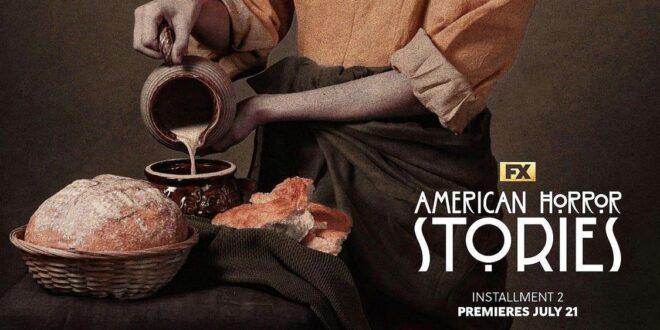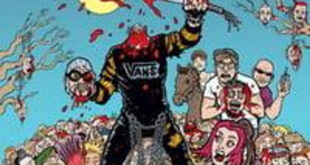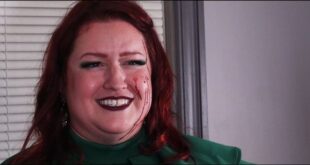At midnight on Thursday, August 11, 2022, American Horror Stories fans from all around the country tuned into Hulu for the long awaited fourth episode of the show, titled “Milkmaids.” Many of them were eager to see the return of Cody Fern (Apocalypse, 1984, Double Feature) while others were simply intrigued by the teaser photos featuring colonial garb and a historical backdrop. Even the name, “Milkmaids,” spurred some curious theories about the plot, such as new mothers being kidnapped and held captive for their breastmilk (okay, that was my theory). This was the first episode written by Our Lady J and also featured cast members Julia Schlaepfer, Seth Gabel, Addison Timlin, and Ian Sharkey.
However, as the clock struck midnight EST, the American Horror Stories community engaged in a collective hullabaloo about why the episode was not appearing on their Hulu home screen. Something similar happened when the first episode of the second season, “Dollhouse” (our recap), didn’t immediately appear when expected. Only after searching for the name of the episode did it appear. This trick, however, did not work for “Milkmaids,” and fans continued to refresh their screens well into the night. In an Instagram live video with fan page ahstoriesfx, fans shared screenshots of their chat with Hulu customer support that the episode wouldn’t be released until 3am EST. Some wondered if the delay was intentional based off the criticism that the previous week’s episode, “Drive,” received.
Giving Hulu the benefit of the doubt, I stayed up until 3am anticipating the episode’s release, albeit my drowsiness and reluctancy. Unfortunately, it did not and wasn’t released until 8am. Based on a screenshot from Hulu customer support on ahstoriesfx’s Instagram story, customer support informed that “there will a delay on adding American Horror Stories Season 2 Episode 4 due to streaming rights.” Hopefully, this was just an anomalous glitch on their part and incidents like this don’t continue to happen with future episodes.

Regardless of the delay, “Milkmaids” was worth the late night anticipation and postponement. As it ended up airing early the next day, I sat down with my morning cup of coffee and a small breakfast to begin enjoying this long awaited episode. The opening scene immediately made me regret my choice to consume anything edible in that moment. In the first five minutes, there was no doubt that this was the only thing in the American Horror Stories universe that has ever made me want to physically vomit (although it did make me glad I didn’t choose yogurt for breakfast).
The scene opens in New England of 1757 inside the home of Thomas Browne (Cody Fern). He and his son, Edward (Ian Sharkey), stand by the death bed of their beloved wife and mother, Rachel, as the doctor informs them that her life is approaching the end. Rachel is one of the many unfortunate souls of the village who became infected with the smallpox virus. Thomas’ two daughters also passed away because of the disease not too long before, and now he must bury his wife next to them in the town’s cemetery.

The following scene shows the town’s new pastor, Walter (Seth Gabel), hesitantly approaching a small cabin where the beautiful, blonde Celeste (Julia Schlaepfer) lives. She welcomes him into the House of Lazarus, and her demeanor insinuates that the Pastor is there for one thing and one thing only. After handing her two coins, he and Celeste engage in an unpassionate bout of missionary before he notices something on her chest. When questioning it, she remarks, “It’s what you came here for.” She pulls back her shirt revealing the notoriously pustulating wounds of the smallpox virus, prompting him as if to quench his hunger. “Are you ready for the feast?”
In a bout of disgust, he throws her off and curses her as she tries to assuage him that her wounds have the power to heal, and that she thought that was the reason for his visit. “Men seek out my services so that this plague will pass over their homes. They say I have been anointed by St. Lazarus!”
Massaging her wounds, she seduces him to indulge in her unholy remedy, insisting, “One lick on my pustules will ward off smallpox indefinitely.” As the Paster cowers away in disgust, she assuages him that it actually tastes pretty good. “Every man who has tasted me has gone on to live a healthy life.” The camera cuts to a close up of her oozing abscess and the thick yellowish-white milky substance that drips out of it. (This was at this moment that I had to suppress the urge to vomit through my muffled screaming bouts of disgust) The Pastor reluctantly lets her finger his mouth with the fresh muculent secretion to “taste heaven” right before he gags and curses her occultist methods.

Let’s take a break from some of the more gut-wrenching spoilers of the show and learn about the history of smallpox, shall we? According to the World Health Organization, “Smallpox is an acute contagious disease caused by the variola virus, a member of the orthopoxviral family. It was one of the most devastating diseases known to humanity and caused millions of deaths before it was eradicated.” Smallpox is also closely related to monkeypox, the rare disease that has made its debut in the United States this summer. As the two are so closely related, the smallpox vaccine can actually prevent the spread of monkeypox. The vaccine was created in 1796 by the British physician after apparently observing milkmaids who had once been infected with cowpox were immune to the smallpox virus and in turn figured out how to inoculate others by using the cowpox virus.
The episode arrives at this conclusion as well, if in a somewhat unconventional manner, as the Brown’s milkmaid, Delilah (Addison Timlin), figures out how to inoculate others by drinking infected milk. Kammi, the family cow that Delilah looks after, had given several bottles of milk with traces of blood in it, as the cow’s udders bore similar but more round versions of the smallpox sores, indicating she had cowpox.
She ends up taking in Celeste after she is violently cast out of the church by Paster Walter, and the two engage in a romantic relationship until Delilah recognizes the sores on Celeste’s body. As a woman of science, she pieces together that because Celeste was once a milkmaid in her past, she must be immune to the virus, which is why she has been able to live despite her pustules, which she keeps fresh and oozing from the friction of her tight corset. During her time with Delilah, Celeste also confessed that she had once been married and had bore a child but when her husband learned of her condition, he took the child and left her, which was why she resorted to prostitution.

In an attempt to share the cure with the town, Delilah was met with violence from Paster Walter. She found him and the rest of the townfolk in the cemetery digging up the deceased bodies of those who had died of the virus. They had been told by the Pastor that because their bodies were not decaying, they were rising from the dead at nighttime and spreading the disease amongst the town. The only way to make oneself safe was to dig up the bodies and eat their hearts (turns out the town was built on shallow groundwater, and the salt in the soil slowed the decomposition process). Upon learning of her consortium with Celeste, he sought out to kill her, too. Thomas, however, intervened and forbade him from doing so, as Celeste was actually his ex-wife and Edward’s real mother.
In the history of science, there is actually a myth that the man who invented the smallpox vaccine was a 13-year-old orphan boy who learned about it from those milkmaids who bragged about their resistance to the disease. Milkmaids were stereotypically known and desired for their milky white skin and beauty. Because of their exposure to cowpox, it was said that this is where the idea for the vaccine originated. The name of the physician who was credited to discovering the vaccine from this myth was Dr. Edward Jenner – Edward being the same name of the boy in “Milkmaids” who wound up an orphan by the end of the episode. There is no doubt the writers of this story made that connection and intended this child to be the one who created the first smallpox vaccine.
However, as most myths are modernly rebuked, in 2018, an article in the New England Journal of Medicine “The Myth of the Milkmaid” reveals that Jenner did not actually get his idea from milkmaids, but from when he was a young apprentice with physicians who learned of the cowpox inoculation from a country surgeon by the name of John Fewster. In 1768, Fewster wrote about his interaction with a farmer who could not be inoculated effectually because of having a “violent degree” of cowpox. Although Fewster was the first to make this connection, it was Jenner who realized how important cowpox could be in the inoculation against smallpox. Although the real history of the milkmaids turned out to be an exaggeration, this episode, like many other tales in the American Horror Stories universe, spins myths into entertainment gold.
There are so many woven layers to this episode of American Horror Stories, including historical, mythological, political, and scientific, that make this one of the best of the entire series. In our contemporary day and age of digital disinformation campaigns and conspiracy theories about vaccines and pandemics, “Milkmaids” is definitely a social commentary on how society reacts to scientific discoveries in the wake of catastrophic plagues. In this episode, we see people blindly cannibalizing the dead by eating their hearts rather than listening to scientific evidence. This isn’t such a stray from our contemporary reality, as during the height of the COVID-19 pandemic, we saw significant amounts of hospitalizations from people drinking bleach and eating horse dewormers and Hydroxychloroquine in hope of warding off the virus. One leader of an anti-COVID-19 vaccine group, Christopher Key, actually called for the drinking of one’s own urine as a cure, touting it as “God’s antidote.” If there’s any lasting takeaway from “Milkmaids,” it’s that no matter what era of history we are in, there will always be those who fanatically choose to ignore science for the sake of unfounded, imbecilic beliefs.
 PopHorror Let's Get Scared
PopHorror Let's Get Scared



